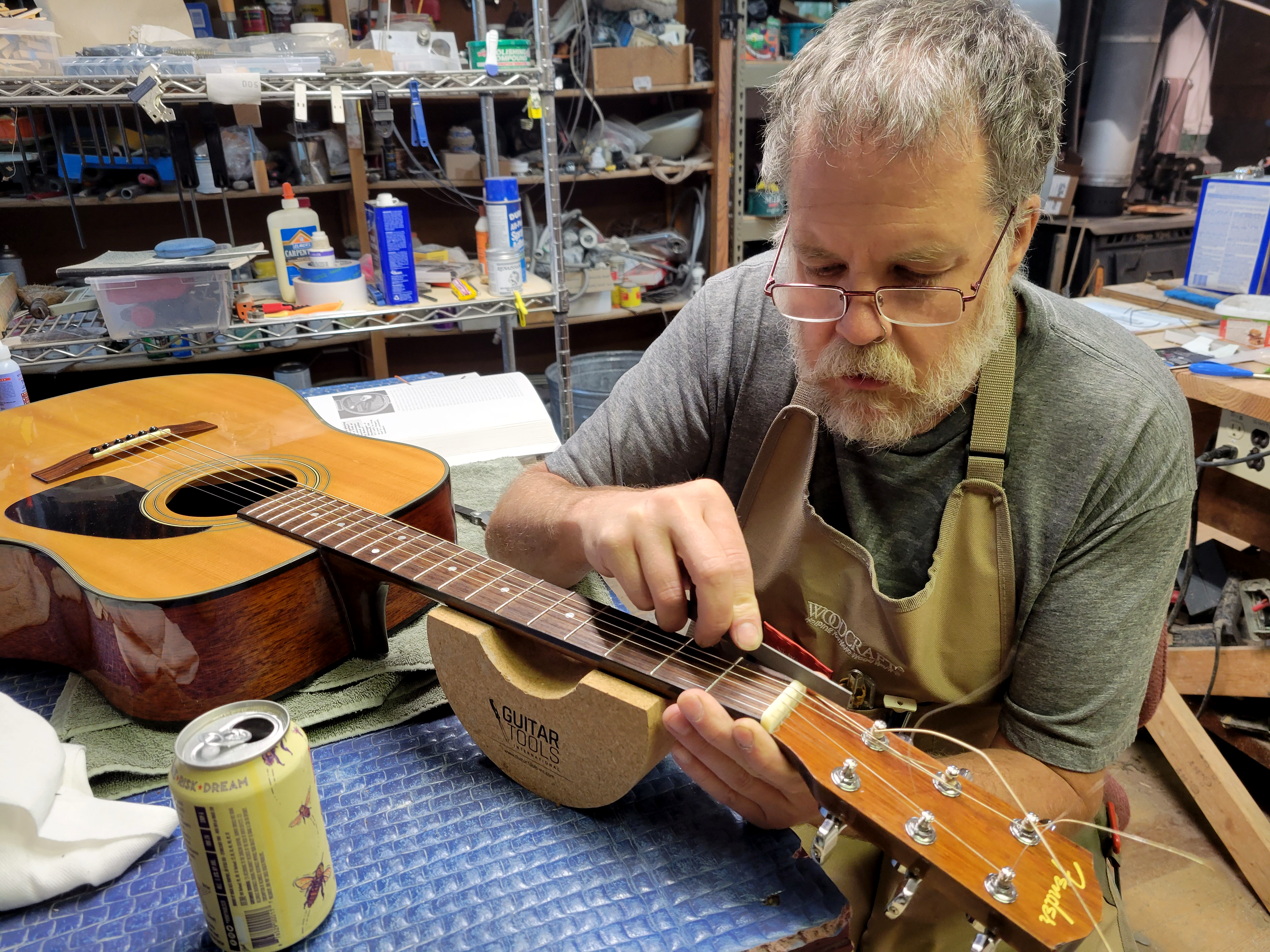You’ve probably heard the term “luthier” before but aren’t sure what a luthier is, what they do, and if you need one for your instrument.
A luthier is a professional craftsperson who builds and repairs stringed instruments, ranging from electric guitars to violins and everything in between. Typically a skilled woodworker, most luthiers will focus on specific types of stringed instruments such as orchestral or guitars.
When you need a luthier is dependent on the skill and knowledge of each instrumentalist. If you are a beginning player you might need a luthier to put new strings on your instrument. If you are a much more advanced instrumentalist you might only need one to fix broken wood or to refinish an instrument. However, unless you are a luthier, it is very likely you will need a luthier at some time in the life of your instrument.
It’s a good idea to find a luthier that does great work and then stick with them. They will get to know you, your instruments, your preferences and your style. If they are good, they will make sure that your instrument is always exactly as you like it to be.
What Instruments Does A Luthier Work On?
The word luthier traces its origins from ‘Luth’, the French word for ‘Lute’ (luthier is pronounced ‘Loot-ee-yer’) meaning someone who makes lutes. Over the centuries the word has become more of an umbrella term for someone who builds any one of a long list of stringed instruments with a neck and sound box.
Luthiers still build and repair lutes, but also an incredibly wide variety of other instruments. We build your everyday instruments such as electric and acoustic guitars, bowed orchestral instruments, mandolins, ukuleles, banjos, and even harps. Less commonly, we build and repair obscure instruments like the oud, mandocello, or sitar.
There is a great deal of difference in the form and function of bowed and plucked / strummed instruments and often a luthier has an area of expertise that they tend to stick closely to. Most luthiers who specialize in working on electric guitars will generally not work on bowed instruments and vice versa. When looking for a luthier it is best to find one whose area of expertise is narrow and focused on the type of instrument you need built or repaired.
When do I need a luthier?
There are many things most players can do to address issues with their instruments, such as fixing a loose tuning mechanism or replacing strings. It just depends on their technical expertise. Some guitar players with electronics backgrounds are perfectly capable of swapping out pickups on an electric guitar yet that same player would have no idea how to perfectly intonate the same instrument.
However, if you don’t know what you’re doing when it comes to instrument repair or set up then you likely needed a luthier before you started messing with your instrument. About a quarter of the repairs I see are because someone (or their buddy) tried to fix an instrument in an attempt to save money. Unfortunately, they did not have the correct tools or skills to do the job properly and this ultimately cost them much more money.
A broken headstock can be a relatively simple repair – if you know what you are doing. The neck has to fit back together perfectly straight and tight. If the mend is off by as little as a fraction of a millimeter it will affect the intonation, tuning, string height and playability. If you don’t repair it properly it is extremely difficult to correct and may involve cutting, splicing, and carving a new piece of wood into the neck. This would take several hours of labor to fix and likely several hundred dollars.
 Luthiers also have a quiver of specialty tools that are made specifically to fix stringed instruments. These tools are often more expensive than the guitars they are being used on and are only cost effective if you do a repair many times. These specialty tools are also designed to limit damage to instruments and do a job precisely.
Luthiers also have a quiver of specialty tools that are made specifically to fix stringed instruments. These tools are often more expensive than the guitars they are being used on and are only cost effective if you do a repair many times. These specialty tools are also designed to limit damage to instruments and do a job precisely.
Nut slotting files, for instance, are more than $100 for a set. But a given set of files may not match exactly the gauges of your preferred set of strings. Luthiers typically have multiple sets and can file the perfect sized slot in the nut.
Even if you fancy yourself pretty adept at setting up a guitar, it helps to be able to say an instrument has been set up by a professional luthier when you try to sell it. When you are considering buying a used car it’s reassuring to know that it has been given the ol’ once over by a certified mechanic. No one wants to hear “My buddy says it runs great and he’s real into cars and stuff.” It is the same when you are dropping a pretty penny on a new instrument.
How Much Does A Luthier Cost?
The repair rate that a luthier charges typically varies on region and experience. A luthier will generally charge between $50 and $90 per hour for their labor. Most luthiers have a fixed rate for most common repairs and setups. For instance, a set up might cost $65 whether it takes 15 minutes or an hour. A refret will typically cost $200 whether it takes two hours or five. Other repairs such as a broken headstock or neck reset might be charged by the hour.
 If you are considering having a custom instrument built by a luthier the rate becomes more of a supply and demand formula. A well known luthier with many years of experience and a backlog of custom orders can charge thousands of dollars for their instruments because there is great demand for their products but very little supply. Whereas a new luthier just starting out may have to sell their instruments for just the cost of materials to get their name out in the market.
If you are considering having a custom instrument built by a luthier the rate becomes more of a supply and demand formula. A well known luthier with many years of experience and a backlog of custom orders can charge thousands of dollars for their instruments because there is great demand for their products but very little supply. Whereas a new luthier just starting out may have to sell their instruments for just the cost of materials to get their name out in the market.
With an experienced luthier you are likely to get the highest quality instrument, one built to your exact specifications. But it comes at a premium cost. With an unknown luthier you are likely to get a screaming deal on a custom instrument built to your specifications but you will likely have to make a few exceptions when it comes to quality.
How Do I Avoid A Luthier?
The only way I know to avoid a luthier completely is to not own a stringed instrument. That said, if you do find yourself the proud owner of a stringed instrument you will more than likely need a good luthier at some point. Whether your neck angle has changed with age, a fret has loosened, or your nephew dinged it with a baseball bat, you are going to need a good luthier to bring your instrument back to its once perfect working order.
However, by taking care of your stringed instrument you can see your luthier less, whether it’s a guitar or an orchestral stringed instrument. In fact, most of our website is dedicated to helping you take care of your own instrument to avoid costly repairs and extend your playing enjoyment.
When it’s time to see a luthier though, do your research, talk to your musician friends, and check out the reviews on luthiers in your neck of the woods. Develop a relationship with them. Tell them where your inspirations come from, who your favorite instrumentalist is, and what your favorite songs are. This is all part of helping them understand how you want your instrument to play and sound.
And bring them beer. Drop off a sixer when you drop off your instrument. They will probably put in a little extra time making sure it is clean and polished before you pick it back up.


